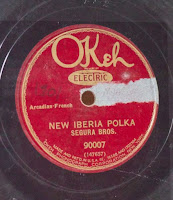This is essential since mazurkas, polkas, gallopades, varsoviannas, and cotillions held a strong place in the early Cajun fiddle and dance repertoire but became less popular with the introduction of the diatonic accordion.1
 |
| Dewey and Eddie Segura |
Segura was of Spanish ancestry, played the German diatonic button accordion, influenced by African and Afro-Caribbean musical traditions, sang in Cajun French, and recorded this polka, a decidedly Old World song style. According to author Ted Olson:
By 1929, Dewey made two or three trips to New Orleans to try and make further recordings, deciding on hunches when the record company might be in town. On the first trip, he hobo-ed to New Orleans by rail with his brother Eddie. They missed the record people, but their uncle was successful in arranging a broadcast for them. The radio station, very probably WWL, ran an anyone-can-play show on which the Seguras played two numbers. The reception to their act was so great (telephone calls and telegrams being received by the station) that the other acts were postponed while he and his bother played "all night".2
By 1966, Nathan Abshire, who was a big fan of the Segura's music, re-recorded the tune with Dewey Balfa, Rodney Balfa and Basile Marcentel as "Old Folks Polka" for Arhoolie Records at the Frontier bar. According to New Orleans musician Tristan Harrell, it's not a polka, but something completely different altogether.
Dewey's rendition of the "New Iberia Polka", recorded in New Orleans in 1928, is perhaps the best musical example of Cajun as a cultural synthesis.4
By 1929, Dewey made two or three trips to New Orleans to try and make further recordings, deciding on hunches when the record company might be in town. On the first trip, he hobo-ed to New Orleans by rail with his brother Eddie. They missed the record people, but their uncle was successful in arranging a broadcast for them. The radio station, very probably WWL, ran an anyone-can-play show on which the Seguras played two numbers. The reception to their act was so great (telephone calls and telegrams being received by the station) that the other acts were postponed while he and his bother played "all night".2
By 1966, Nathan Abshire, who was a big fan of the Segura's music, re-recorded the tune with Dewey Balfa, Rodney Balfa and Basile Marcentel as "Old Folks Polka" for Arhoolie Records at the Frontier bar. According to New Orleans musician Tristan Harrell, it's not a polka, but something completely different altogether.
What’s funny is this isn’t a polka at all. It’s a Shottische/Chotis (spanish). Funny how a polka evidently meant something different to these guys.3
- https://oldtimeparty.wordpress.com/2014/06/18/himself/#more-10194
- Old Time Music. No.40. Winter 1984. John H Cowley
- Discussions with Tristan Harrell
- Crossroads: A Southern Culture Annual edited by Ted Olson
Find:
Louisiana Cajun Music Volume 1: First Recordings - The 1920's (Old Timey, 1970)
Cajun Louisiane 1928-1939 (Fremeaux, 2003)
Cajun Country, Vol. 2, More Hits from the Swamp (JSP, 2005)


No comments:
Post a Comment
Got info? Pics? Feel free to submit.